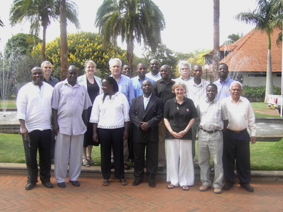Global, 2006-2011
The US Government Presidential Malaria Initiative (PMI) aims to reduce malaria deaths by 50% over three years. To achieve this PMI supports the scale up of key malaria control interventions including artemisinin-based combination therapies (ACTs), insecticide treated nets (ITNs), intermittent preventive treatment for all pregnant women (IPT), and indoor residual spraying (IRS) in 15 African countries. USAID is responsible for PMI on behalf of the US government and has contracted RTI to lead implementation of the IRS component of the programme.
LATH has been sub-contracted by RTI to provide technical assistance in the following key areas:
- Entomological monitoring and surveillance
- Providing strategic advice to national governments on the rational choice of insecticides
- Undertaking cost-effectiveness analyses of IRS
We have two long term staff based in Nairobi providing technical assistance to PMI countries in entomological monitoring and insecticide selection. In Uganda LATH has recently carried out entomological investigations on insecticide resistance and the residual action of insecticides on different sprayed surfaces. In Mozambique we have established sentinel sites and are monitoring changes in vector density, insecticide resistance and residual action of insecticides.
An East and Southern Africa Insecticide Selection and Entomological Surveillance Workshop was held in Nairobi in March 2009. The workshop was funded under the IRS Programme and representatives from MoH’s in Zambia, Malawi and Uganda, LSTM, LATH, RTI, Wellcome, CDC and USAID attended. Outcomes from the workshop included a number of follow up activities as follows:
Outcomes from the workshop included a number of follow up activities as follows:
- A desk based country capacity assessment for molecular testing (including lab and human resources) is to be carried out and a wider capacity assessment to include existence of insectary facilities and susceptible colonies
- Annual plans and budgets to be produced, to feed into the October 09- September 2010 Malaria Operational Planning (MOP) period in Malawi, Zambia, Mozambique, Uganda, Angola and Liberia
- Produce scope of works to govern work between now and start of MOP in same countries
- Manual of Standard Operating Procedures (SOP) for the different entomological indicators to be produced
- SOP and budgets for testing IVCC IQK (Insecticide quantification kit) validation against cone assays in Malawi, Kenya, Ghana and Zambia.